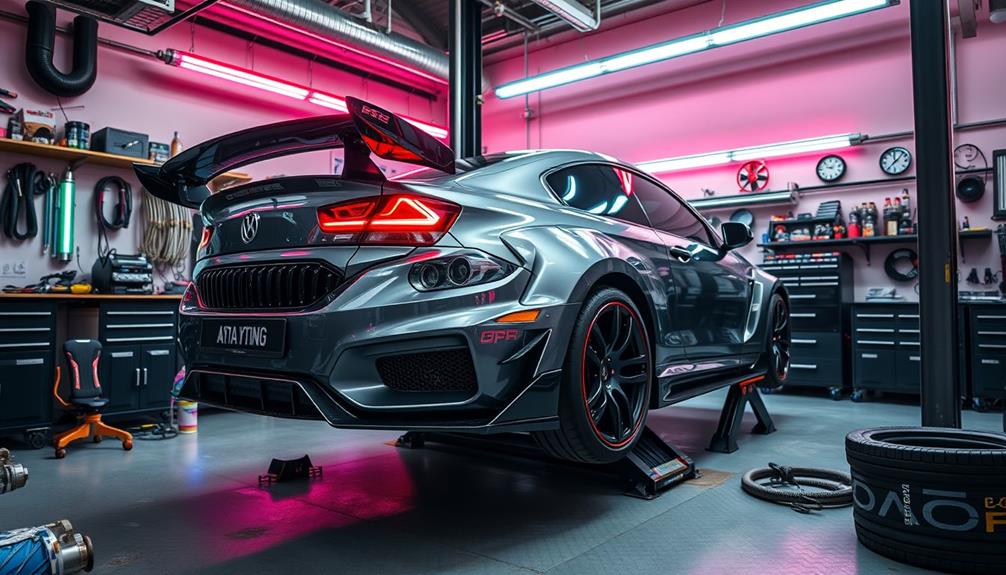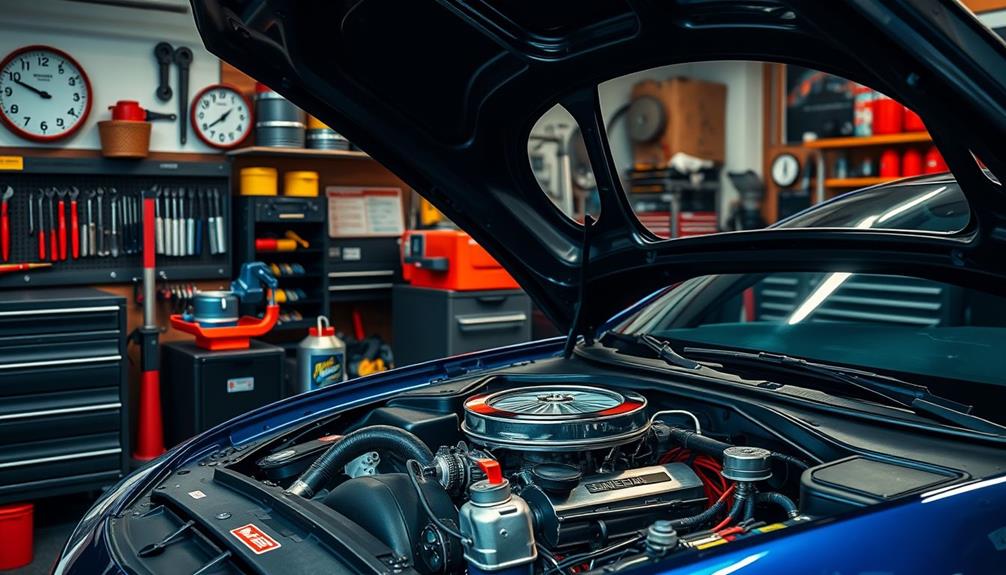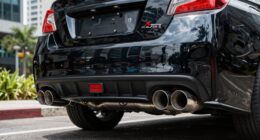To keep your tuned vehicle performing its best, regularly check and maintain fluid levels, including engine oil, coolant, and transmission fluid, and replace filters on schedule. Conduct performance checks, inspect critical components like brakes, tires, and suspension, and verify everything is aligned and in top condition. Monitor your modifications for ideal results, and use performance tools to spot issues early. Stay proactive—more tips are just ahead to help you maintain peak vehicle performance.
Key Takeaways
- Conduct routine performance checks and dyno tuning after modifications to optimize system integration and engine output.
- Regularly inspect and replace fluids, filters, and critical components to prevent wear and ensure smooth operation.
- Monitor brake, tire, and suspension systems to maintain handling, safety, and ride quality.
- Track upgrade performance using monitoring tools and perform KPI reviews for ongoing optimization.
- Engage with automotive communities and ensure all modifications comply with local regulations for safety and legality.
Scheduling Regular Performance Checks
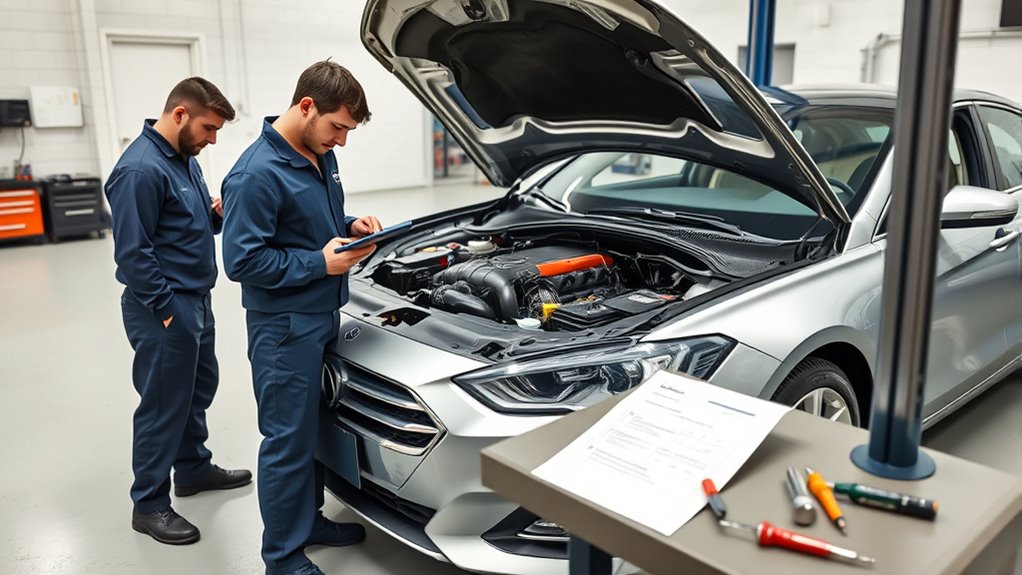
Scheduling regular performance checks is essential to keep your vehicle running smoothly and efficiently. After adding performance parts, like turbochargers or exhaust systems, dyno tuning ensures everything works together ideally. Electrical and ignition system checks are vital to prevent electrical failures that could cause engine misfires or damage. Regular checks also help adapt your engine to seasonal weather changes, maintaining consistent performance year-round. By monitoring horsepower and torque, you can maximize your engine’s output and efficiency. These checks enable early detection of potential issues, preventing costly repairs and increasing safety. Additionally, maintaining peak performance through scheduled tuning can improve fuel economy and prolong engine life. Incorporating preventive maintenance practices allows for early identification of wear and tear, reducing the risk of unexpected breakdowns. Consistent performance assessments also help meet your driving goals, whether for daily commuting or racing. Staying proactive with performance checks ensures your vehicle remains reliable, safe, and at its best, no matter the conditions. Regular maintenance practices are aligned with software quality assurance best practices, emphasizing the importance of continuous improvement and early issue detection in vehicle care.
Managing Fluid Levels and Replacements
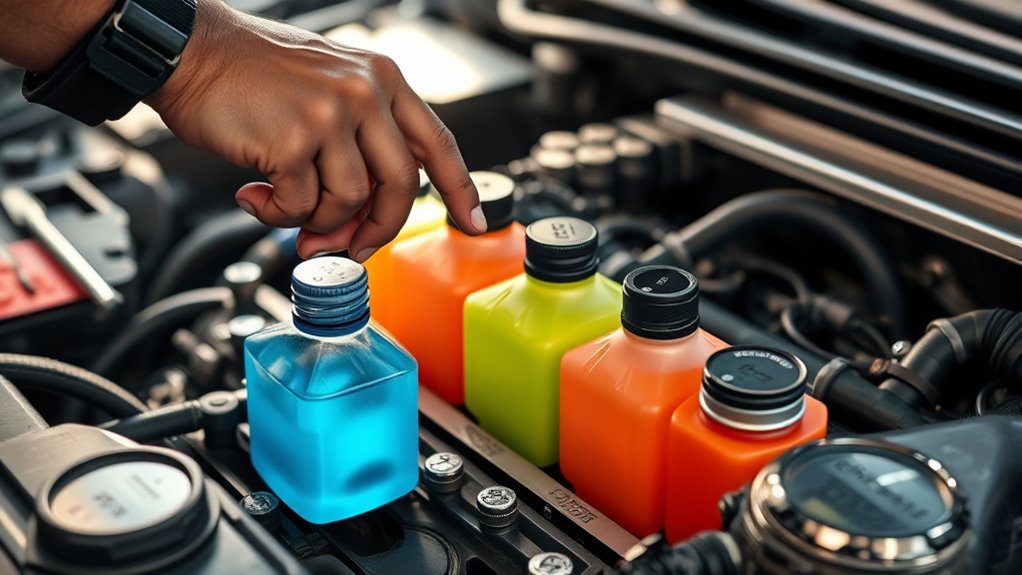
Maintaining proper fluid levels is essential for your vehicle’s ideal performance and longevity. Regularly check each fluid type to prevent damage and ensure smooth operation. Use the right fluids as specified in your owner’s manual, and always check on level ground. Avoid overfilling, which can harm components, and keep reservoir caps and dipsticks clean for accurate readings. Schedule fluid replacements based on mileage or time frames:
| Fluid Type | Replacement Interval | Key Function |
|---|---|---|
| Engine Oil | Every 3,000–5,000 miles | Lubricates and cools engine parts |
| Transmission Fluid | Every 50,000–100,000 miles | Ensures smooth gear shifts |
| Coolant | Every 5 years or 250,000 km | Regulates engine temperature |
Maintaining proper fluid levels also helps prevent costly repairs by catching issues early.] Stick to these guidelines to keep your vehicle running smoothly.
Replacing and Maintaining Filters
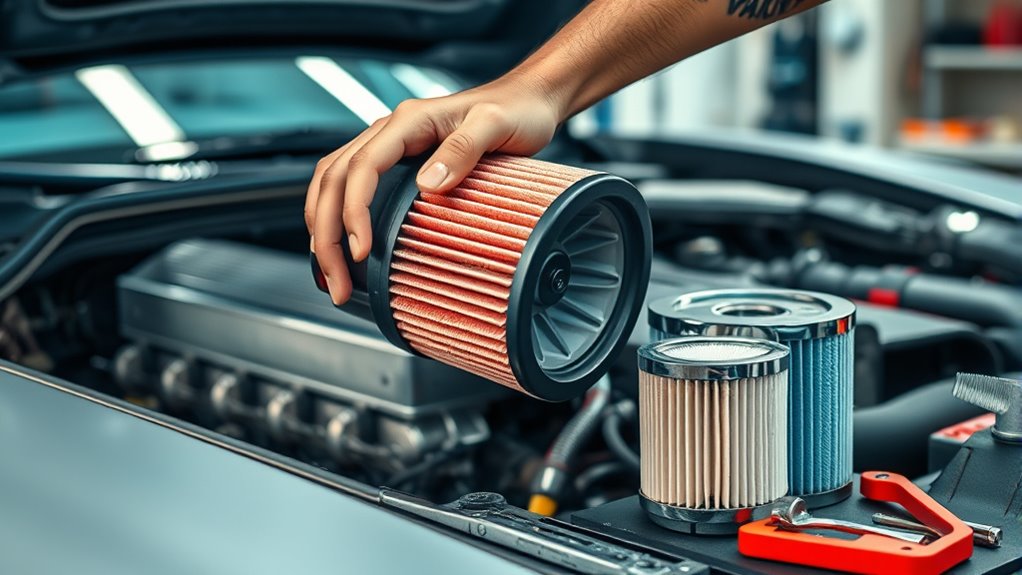
Keeping your vehicle’s filters in good shape is key to maintaining peak performance. Regularly replacing your air, fuel, oil, and cabin filters ensures your engine runs smoothly and efficiently.
Maintaining your vehicle’s filters is essential for optimal performance and longevity.
For air filters, change them every 12,000 to 20,000 miles or annually, depending on conditions. Fresh filters improve fuel economy, engine power, and longevity, while neglect leads to decreased MPG and potential damage. Regular replacement prevents debris buildup that can impair engine function. Additionally, the quality of the filters used can impact overall engine health and efficiency.
Fuel filters should be replaced every 30,000 to 40,000 miles to prevent clogging and protect fuel injectors.
Oil filters need changing with each oil change, typically every 3,000 to 7,000 miles, to keep oil clean and prevent engine wear.
Cabin air filters should be replaced every 15,000 to 25,000 miles to maintain air quality and HVAC efficiency. Regular filter maintenance contributes to vehicle longevity and optimal operation.
Always follow manufacturer recommendations for precise intervals.
Ensuring Brake System Reliability
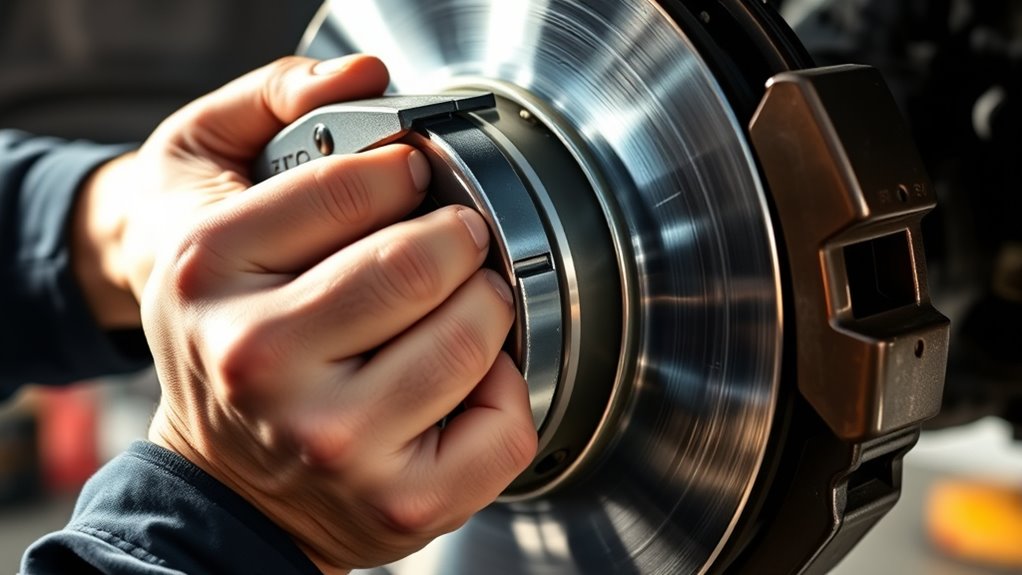
Ensuring brake system reliability is essential for your safety and vehicle performance. Regularly check your brake fluid level to reduce strain on the master cylinder and prevent brake failure. Keeping brake fluid full helps maintain proper hydraulic pressure, ensuring effective braking. Perform visual inspections for wear, scratches, and pits on rotors and pads, and monitor dashboard indicators for any brake warnings. Inspect calipers for rust or cracks, as damaged components can compromise braking efficiency. Replace worn brake pads before they damage rotors, extending component life. Use quality parts, like OEM replacements, to guarantee durability. Bleed brake lines every 2 to 3 years to eliminate air, maintaining consistent performance. Additionally, understanding sound vibrations can help diagnose issues with brake components, as unusual noises often indicate underlying problems. Being aware of brake system vulnerabilities can help you identify and address issues proactively. Proper maintenance prevents costly repairs and ensures your brakes respond reliably during critical moments, keeping you safe on the road.
Caring for Tires and Suspension Components
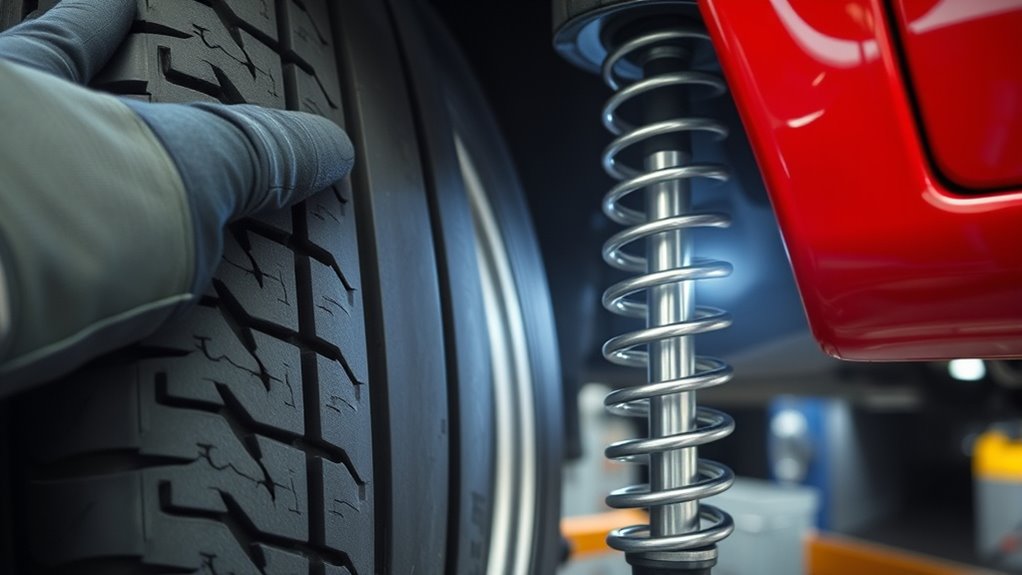
Taking care of your tires and suspension components is essential for safe and smooth driving. Regularly inspect your tires for cuts, punctures, cracks, and bulges. Keep tire pressure at the recommended levels to improve safety, reduce wear, and boost fuel efficiency. Rotate your tires every 6,000 to 8,000 miles to promote even tread wear and extend their lifespan. Proper tire pressure also reduces heat buildup, which can cause blowouts and other failures. Ensure your suspension components, like shocks and bushings, are in good condition through routine checks. Keep wheel alignment precise to prevent uneven tire wear. Proper maintenance increases your vehicle’s handling and stability, giving you confidence on every drive.
- Feel the thrill of confident handling when your suspension is tuned perfectly.
- Experience the safety of tires that grip every curve with unwavering trust.
- Enjoy the smoothest ride, knowing your tires and suspension are in top shape.
Optimizing Engine and Fuel System Performance
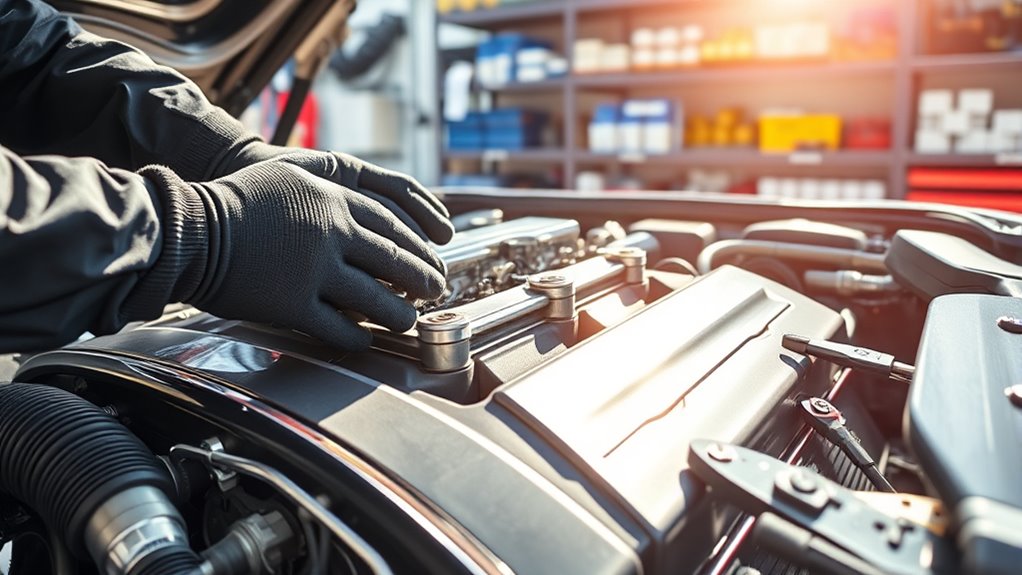
Optimizing your engine and fuel system performance can substantially boost your vehicle’s power, efficiency, and reliability. Focus on airflow improvements through better filters, intake manifolds, and exhaust systems to enhance combustion. Upgrading turbochargers and intercoolers forces more air into the engine, increasing power. Reprogramming the ECU with chip tuning unlocks extra performance without mechanical changes. Fine-tuning ignition timing and fuel injection with specialized software further maximizes output. For the fuel system, adjusting the air-fuel mixture, ensuring proper fuel pressure, and cleaning injectors improve efficiency. Regularly replacing fuel filters keeps contaminants out. Engine tuning can also involve both electronic and mechanical modifications to optimize overall vehicle responsiveness and performance enhancement. Additionally, maintaining proper suspension settings ensures your vehicle handles optimally under increased power conditions. Use the table below to understand key components and their roles:
| Component | Function | Maintenance Tip |
|---|---|---|
| Air Filter | Ensures clean airflow | Replace when dirty |
| Turbocharger | Boosts air intake | Check for leaks and proper operation |
| Fuel Injectors | Atomize fuel for combustion | Clean periodically |
Monitoring and Adjusting for Custom Modifications

Monitoring and adjusting for custom modifications is essential to maintain vehicle performance, safety, and reliability. Regularly track how your upgrades perform using performance monitoring tools to catch issues early and fine-tune settings for *ideal* results. Keep detailed inspection records to identify patterns and *guarantee* everything functions correctly over time. Regular KPI reviews help ensure your vehicle stays optimized by providing ongoing insights into performance metrics. Engage with car enthusiast communities for feedback and advice, helping you stay ahead of potential problems. Additionally, *guarantee* your modifications comply with local regulations to avoid costly penalties. Staying informed about automotive trends can also help you adapt and improve your vehicle’s performance over time. Utilizing predictive analytics can further assist in anticipating future issues before they impact your vehicle’s operation.
You’ll benefit from:
- Using performance tools to identify areas for improvement, boosting confidence in your vehicle’s capabilities.
- Regular inspections to catch safety concerns early, protecting you and your investment.
- Staying engaged with the community for ongoing support and ideas, keeping your ride in top shape.
Frequently Asked Questions
How Often Should I Schedule Performance Diagnostics for My Tuned Vehicle?
You should schedule performance diagnostics based on your vehicle’s usage and modifications. Generally, every 15,000 to 30,000 miles, but more often if you drive in harsh conditions or have extensive tuning upgrades like turbocharging or ECU remapping.
Keep an eye on performance and fuel efficiency. Regular checks help catch issues early, maintain best performance, and prevent costly repairs, especially if your vehicle is heavily modified or driven under demanding conditions.
Are There Specific Fluids Recommended for High-Performance Engine Components?
You’re asking about the best fluids for high-performance engine components. For extreme heat and pressure, use specialized synthetic engine oils with high additive concentrations and elevated ZDDP levels, which protect flat-tappet cams.
Opt for racing-grade coolants, high-temperature brake fluids, and gear oils with extreme-pressure additives. These fluids guarantee your engine and drivetrain perform reliably under demanding conditions, preventing wear and maintaining ideal power during intense driving sessions.
When Should I Upgrade My Suspension for Better Handling After Tuning?
Imagine pushing your tuned car through sharp turns, feeling the body lean and tires struggle for grip. You should upgrade your suspension when you notice increased body roll, unstable handling, or harsh impacts during spirited drives.
Timing matters—do it after initial tuning or before significant power boosts, and always inspect components first. A proper upgrade transforms your ride, giving you sharper steering, better stability, and confidence to conquer every twist and turn.
How Do I Identify Signs of Brake System Wear in a Modified Vehicle?
To spot brake system wear in your modified vehicle, pay attention to noises like squealing, grinding, or clicking when braking.
Feel for vibrations or pulsations through the pedal or steering wheel, especially during hard stops.
Visually, check for thin pads below 3mm, glazed rotors, cracks, or uneven wear patterns.
Also, monitor pedal softness or sponginess and watch for warning lights, which signal wear or fluid issues needing immediate attention.
What Are the Best Practices for Maintaining Custom Exhaust Systems?
Think of your exhaust system as the lungs of your car—if it’s clogged or damaged, performance suffers. To keep it breathing easy, perform regular visual inspections for cracks, rust, and leaks.
Clean out carbon buildup, tighten loose parts, and apply protective coatings. Follow manufacturer guidelines, replace worn components, and schedule professional checkups.
Conclusion
Just like a well-tuned orchestra, your vehicle needs regular care to perform at its best. By staying on top of maintenance, you guarantee your ride remains smooth and reliable, much like a maestro guiding a symphony. Think of your car as a trusted companion—if you nurture it with consistent checks and adjustments, it’ll reward you with years of dependable service. Keep the rhythm steady, and your vehicle will always be ready for the road ahead.


